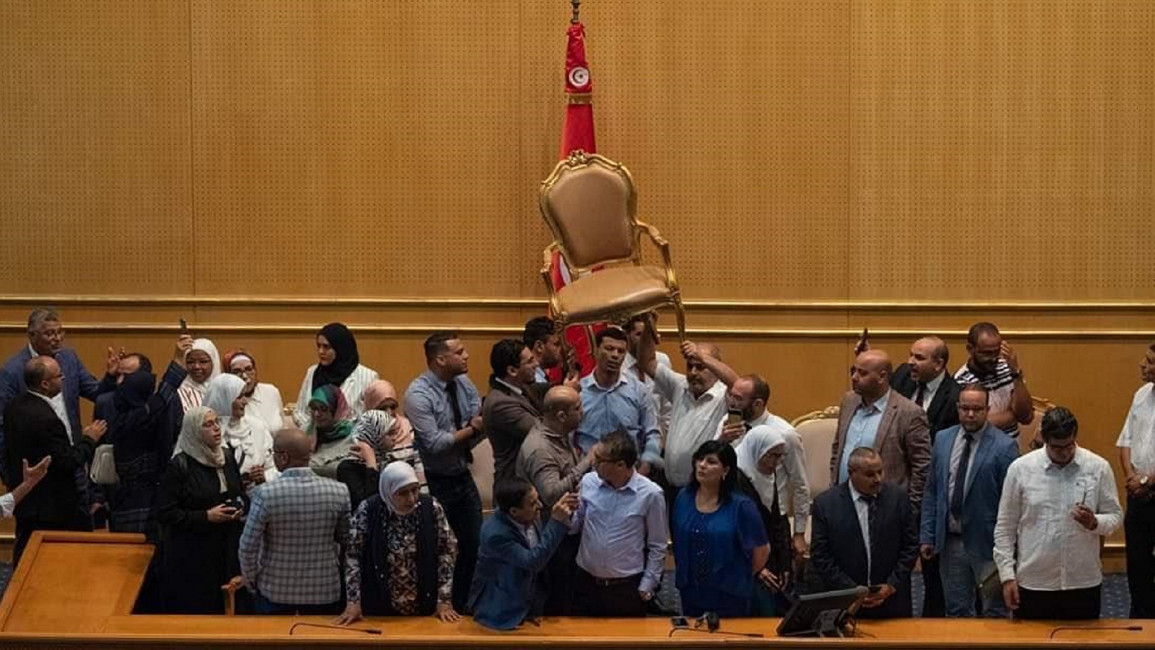Chaos in Tunisian parliament as ‘counter-revolutionary’ MPs continue occupation
The Speaker of the Tunisian parliament and head of the moderate Islamist Ennahda Party, Rached El-Ghannouchi, has threatened to take legal action against the leader of the Free Constitutional Party, Abir Moussi, following a week-long occupation of parliament by members of the Free Constitutional Party.
The Free Constitutional Party was founded by former members of the Constitutional Democratic Rally, which was the ruling party in Tunisia under former dictator Zine el-Abidine Bin Ali, who was overthrown by a revolution in 2011. It currently holds 16 seats in parliament.
Chaotic scenes prevailed in the Bardo Palace, where the Tunisian parliament sits, on Thursday as MPs from the Karama Coalition, which has 19 seats in parliament, protested the occupation by Free Constitutional Party MPs of the seat of the Speaker of the Parliament.
The Free Constitutional Party’s occupation began last Friday and has prevented parliamentary sessions to choose a new Tunisian prime minister from being held. Tunisian Prime Minister Elyes Fakhfakh resigned on Wenesday after the Ennahda Party tabled a motion of no confidence in him. He sacked all Ennahda’s government ministers before resigning and is continuing as prime minister in a caretaker capacity.
Read also: Tunisia's marginalised Tataouine rises up against broken government promises
In a video shot in parliament, the leader of the Al-Karama coalition, Seifeddine Makhlouf, shouted that the Free Constitutional Party’s members were attempting a coup and that the occupation was “a crime whose penalty is death”.
| Facebook Post |
The Al-Karama coalition holds 19 seats in the Tunisian parliament and includes populist and Islamist MPs.
The Free Constitutional Party is demanding a motion of no confidence in Ghannouchi and is ideologically opposed to the Ennahda Party, claiming that it has ties to “terrorism”.
Moussi has voiced opposition to the 2011 revolution that brought democracy to Tunisia and claims that she is constantly being followed and has received death threats from Ennahda’s supporters.
Some reports have accused her of receiving backing from the UAE, which has fiercely opposed both Islamist groups and the revolutions of the Arab Spring, which started in Tunisia.
MPs from many different parties have condemned the Free Constitutional Party’s tactics. Leila Haddad, an MP from the socialist People’s Movement, told the Arabic news website Arabi 21, “What’s happening is truly shameful... it is basically a strike against democracy and a planned action by the Free Constitutional Party to stop the work of parliament.”
Ennahda MP Ahmed Ben Moussi said that he had been verbally and physically assaulted by Free Constitutional Party MPs in parliament. “I was held up by members of the Constitutional Party and a door was closed on me, and then I was verbally and physically assaulted”, adding that he would take the MPs who assaulted him, including Abir Moussi, to court.
Ghannouchi said that “a criminal case will be raised against Abir Moussi and her party for stopping the work of parliament”.
However, Free Constitutional MP Majdi Bouzina said that the “party would continue its protest, and prevent sessions being held because it is protesting violence and terrorism.”
Tunisia was plunged into a political crisis this month when the Ennahda Party withdrew its support from Prime Minister Elyes Fakhfakh after allegations were made that he owned shares in companies which had received contracts worth $15 million from the Tunisian state.
The political crisis has been accompanied by an economic downturn linked to coronavirus and hundreds of people have protested against unemployment and inequality.
Follow us on Facebook, Twitter and Instagram to stay connected



